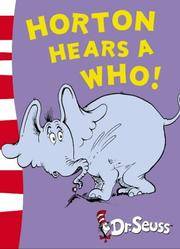 I lost my initial enthusiasm to see Horton Hears a Who when I heard the pro-life crowd had co-opted it. Although I’m pro-choice, I do know people who are honorably pro-life, and these days I generally try to stay away from arguments over when a fetus becomes a baby. However, I am sure that protesting at a children’s movie is creepy. Nonetheless, my kids were gung-ho about going, so thought I would see what the fuss was about.
I lost my initial enthusiasm to see Horton Hears a Who when I heard the pro-life crowd had co-opted it. Although I’m pro-choice, I do know people who are honorably pro-life, and these days I generally try to stay away from arguments over when a fetus becomes a baby. However, I am sure that protesting at a children’s movie is creepy. Nonetheless, my kids were gung-ho about going, so thought I would see what the fuss was about.
Horton Hears a Who is a Dr. Seuss children’s book about tolerance and care for all creatures. Horton is an elephant who hears an entire little city of people (Whoville) inside a dust speck on a flower. He is first ridiculed for his beliefs, then imprisoned in a cage, and then a mob of jungle creatures almost destroy the speck before the voices of all the Whos finally come together to be heard. The mob then realizes Horton was telling the truth, and they all decide to protect the little speck.
The tag line for the story is “a person’s a person, no matter how small,” and has long been a phrase used by pro-life groups. However, this was not Theodor Geisel’s intent with the story, and in fact he had threatened to sue these groups over the issue while he was alive.
All of this was on my mind as I watched the movie with my kids. Subsequently, I was struck by how much this story is a rich source of metaphor and message. Sure, the pro-lifers have a decent metaphor for fetuses, especially if you believe there is no difference between a person and fetus (and that inside a womb there are entire cities of fetuses/people with enough social development to elect mayors). But this just shows that there is something for everyone in this movie, and plenty of ways to interpret the story.
Here are a few other examples of how Horton might be mined for metaphors:
The Whos as socially responsible voters. Seuss actually had this in mind when he wrote the book, as a way to encourage the Japanese to vote in post-WWII Japan. It is only when all the voices are heard that Whoville is saved.
Horton as social activist. Horton stumbles upon a powerless social group that is threatened, and decides to advocate for them, at great personal effort and risk to himself.
The Whos as threatened species. When an entire civilization screams “We are here!” to a disinterested or even hostile group of power-brokers, it is hard not to think about what we are doing to species around the planet.
The Whos as McCarthy-era blacklisted writers. This was also a parallel drawn at the time the book came out. Blacklisted writers were silenced and harassed by those in power. Some might call this a “pro-choice” message.
Horton as victim of religious intolerance. Horton is ostracized for believing in something that no one else can see. Actually, both pro- and anti-religious advocates can co-opt this because it all depends on who is currently in power as to who feels like they are being oppressed. Hooray for metaphor! Although, I should point out that the history of western civilization has been pretty one-sided on this, as it always seems like the people who believe in God are the ones who literally put others in cages for their beliefs.
Horton as Abu-Ghraib victim. Horton is forced into a cage and suffers indignities without a trial and without the protection of international law. Obviously, this is an anti-torture movie.
The Whos as victims of empire. The jungle animals represent citizens of an empire who could not care less how their actions affect smaller, subjugated states, and who cannot be heard above the din of mass-market globalization and consumer frenzied capitalism.
Horton as advocate for legalized drugs. An entire world in a speck? Our world just a speck on another world? A much more reasonable explanation for the whole story is that Horton has ingested some kind of psychedelic drug and is high as a kite the whole time. He finally manages to slip some of it to everyone else, so they can dig it too, man.
So, there you have it. Horton Hears a Who is really a pro-life, pro-choice, pro-social-responsibility, pro-environment, pro-social activist, anti-torture, anti-empire, pro-tolerance, pro-freedom, and pro-drug-use movie.
If only we could have had everyone with a stake in any of these principles protest for or against this movie, we could have really scared the crap out of the kids.








